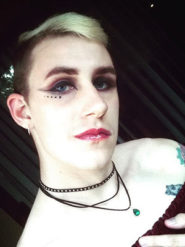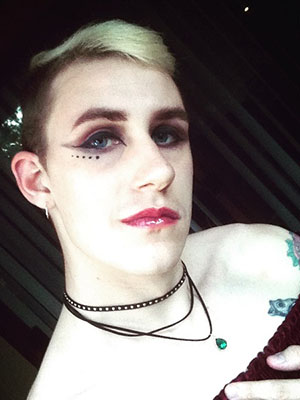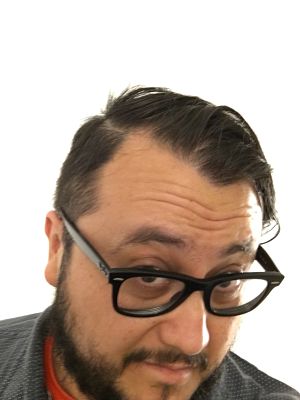Litdish: torrin a. greathouse, Poet
 torrin a. greathouse (she/her or they/them pronouns) is a genderqueer trans woman & cripple-punk from Southern California. Her work is published or forthcoming in Bettering American Poetry, Muzzle, Redivider, BOAAT, Waxwing, The Offing, Frontier, and Michigan Quarterly Review. She is the author of two chapbooks, Therǝ is a Case That I Ɐm(Damaged Goods, 2017) and boy/girl/ghost (TAR Chapbook Series, 2018). When they are not writing their hobbies include pursuing a bachelors degree, awkwardly drinking coffee at parties, and trying to find some goddamn size thirteen heels. They were featured in Lunch Ticket 11 and nominated for a Pushcart Award and The Best of the Net award.
torrin a. greathouse (she/her or they/them pronouns) is a genderqueer trans woman & cripple-punk from Southern California. Her work is published or forthcoming in Bettering American Poetry, Muzzle, Redivider, BOAAT, Waxwing, The Offing, Frontier, and Michigan Quarterly Review. She is the author of two chapbooks, Therǝ is a Case That I Ɐm(Damaged Goods, 2017) and boy/girl/ghost (TAR Chapbook Series, 2018). When they are not writing their hobbies include pursuing a bachelors degree, awkwardly drinking coffee at parties, and trying to find some goddamn size thirteen heels. They were featured in Lunch Ticket 11 and nominated for a Pushcart Award and The Best of the Net award.
10 Questions for torrin a. greathouse:
1. Where are you writing us from?
I’m writing from Orange County, California, where I’m currently living in an overcrowded apartment while working on finishing up my undergraduate degree. While I wish I had more room and no upstairs neighbors, I live with only other trans folx, and that has made for a really important sanctuary in the last year.
2. What’s the most recent thing you’ve written?
The most recent poem I have written is a work-in-progress analyzing the relationship between the prison and mental hospital as carceral institutions, and the influence these exert over queer bodies. Recently, I have been interested in discussing and dissecting institutions of power and violence—particularly American gun culture, and the ways in which it intersects with white culture.
Not too long ago a poem of mine, “Somewhere in america, a gun,” was published in Waxwing. While this poem responded abstractly to gun violence in America and the difference between hearing a gunshot growing up in a rural setting and in the city, it was published—by chance—the day after the mass shooting in Parkland, Florida. People’s response to that poem was incredible, and as with many poems published in the wake of tragedies, I think it helped deliver some sense of catharsis for what many of us were feeling.
Despite this, I spent the majority of the day physically ill over the timing of things. It served as a reminder that as long as we are complicit in a culture that is more interested in the rights of the weapon owner than the lives those weapons continue to be used to take, poems like mine or Kathy Fish’s “Collective Nouns for Humans in the Wild,” will never cease becoming relevant again and again.
3. What’s your writing practice like?
A lot of writing for me is gestational. By the time I open a word processor, most of the poem is already in my head or spread across a dozen notes and documents of spare lines. I draw a lot of inspiration from language itself, definitions, etymology. I think that language (and particularly English as a colonial language) is embedded with such a complex history of appropriation and violence that it can bear a high level of interrogation. A lot of my recent writing has also focused on traumatic experiences and the fungibility of memory. There’s a beautiful quote from Paisley Rekdal’s “Nightingale: a Gloss” where she says “In life, time’s passage allows us to see change, but a poem’s chronology forces us to see repetition: lyric time is not progressive but fragmentary and recursive. Traumatic time works like lyric time: the now of terror repeatedly breaking back through the crust of one’s consciousness.” Lately, my writing practice has involved the constant consideration of my experiences as they are reenacted in my mind, the recursive experience of trauma. I am interested in writing into this modality, seeing how this understanding of time shapes and reshapes the narratives my work reproduces.
4. How does your day job inform your writing?
It keeps me fed and housed. I think that, culturally, we put a lot of stake in the starving artist trope, often glorifying even self-imposed poverty. In my experience, it has always been easiest to write when I have a bed and my stomach is full. Even if I don’t particularly enjoy my work, it gives me enough separation from the day-to-day, minute-to-minute of survival and grants me space to reflect. Without that, I think it would be just about impossible for me to write.
5. What should we be reading?
This has always struck me as the impossible interview question that’s always pitched. I try to keep up on about three dozen different lit mags, and I could list literally hundreds of poets who are doing incredible and vital work. There are of course the big names, Kaveh Akbar, Maggie Smith, sam sax, Layli Long Soldier, Max Ritvo, Rachel McKibbens, Christopher Soto, and Danez Smith, who I adore, but once again, there are too many to name.
At the moment, I am (re)reading I am Made to Leave I am Made to Return by Marwa Helal, Nature Poem by Tommy Pico, al youm by George Abraham, agon by Judith Goldman, and White Papers by Martha Collins. I am in a space of trying to read what teaches me. So many of these authors have shown me routes to addressing systematic violence and oppression, or how culture conditions us. Collins’ book (which sam sax recommended to me) has been helping me consider how to write into, about, and against whiteness, while addressing my complicity in the oppressive structure that is white America.
If I had to pick out a few poets that I think more people should be reading if they aren’t, here are my picks: George Abraham, because their work on Palestinian identity and political erasure is so uniquely vital. Liv Mammone, who’s a brilliant poet and activist writing complex pieces around disability (if I could force every able-bodied person sit down and read their poem “I Can’t be a Confessional Poet Because Basically All I Want to Say is This,” I would). Khaya Osborne, Logan February, and Jasmine Cui are all young poets absolutely bursting with talent that people should keep their eyes out for. But if there’s one poet that I think the whole scene is sleeping on, it’s Nicole Connolly. Just read “Eve Knows How to Make the Asp’s Mouth an Entrance” or “No Credible Physicist Believes in a Bio-Centric Universe Anymore” and tell me they aren’t doing work like no one else is right now.
I also think that the side-by-side of “Song” by Brigit Pegeen Kelly, and Jeanann Verlee’s response “The Violence Question, Answered by a Goat, Or, Notes Toward a Discourse on Haunting through Poetry” should somehow be required reading.
6. What’s your favorite album?
I really wracked my brain for this one. There are so many albums that are deeply formational for me, as well as concept albums that have affected the way I think. The last three albums by The Wonder Years have all inflected the way I put together my chapbooks, Therǝ is a Case That I Ɐm and boy/girl/ghost (which is coming out later this year), as well as a full-length collection I am currently working on shopping out to publishers. I’m also a gigantic Springsteen fan, but my favorite songs are spread across five or six different albums. So, I think just in terms of emotional resonance, I’d have to pick Transgender Dysphoria Blues by Against Me! All the songs on this album were so fundamental to the process of me coming out as trans that I don’t think any album can even come close. It’s still the first thing I put on every day as I put on my makeup and get ready to go out into the world.
7. What are some of your non-literary interests?
Honestly, I’m so boring if you remove writing from my life. I clean my apartment, I cook with my partners, I go to class. Lately, I’ve been trying to pick up old hobbies, sketching and playing guitar. Both of these are much much harder now that I have arthritis in my hands, but the slow progress is rewarding. I also try to stay engaged in queer activist spaces around my campus, educating and doing the work that I can.
8. What’s a piece of advice you’d like to pass on to young/emerging writers?
I largely conceptualize myself as a young emerging writer, which often places me in a weird position of feeling under-qualified to give advice. There are a few pieces of advice that I think have deeply inflected the way I interact with the world as a poet. The first comes from Kaveh Akbar. When you lose confidence in your writing, throw yourself into reading, and let the voices of your forebears carry you until you find your own voice again. And the second, from Luther Hughes, sometimes in a poem you need to just fucking say what you mean. There’s a danger in making things too beautiful to be understood, and sometimes sounding “like a poem” is the worst thing for a given piece.
9. Why do you write?
A lot of writing for me is processing and meditating on a topic, whether it be gun violence, trauma, or quantum mechanics. In Colleen Abel’s recent Ploughshares blog “Learning to Love the Long Poem,” she discusses the “argument that all poems are essentially persuasive—that all poems are rhetorical devices,” which I find useful to understanding my own work. Even my shortest pieces often have an implicit argument, this often being “look, people like me are being killed and you should care.” So I think there’s a sense in which I write to be seen, to make myself real, to reclaim my humanity (because as a disabled trans woman, it is so often stripped from me). Though, at the same time, I don’t want to say my work seeks to humanize me—and by extension other trans people. I am human, I always have been, and will be. Christopher Soto discusses the problematics of the idea that poetry “humanizes” far more in depth than I will here in a fantastic essay for Poetry Magazine. They question whether “It [is] possible to fight against otherness/dehumanization without being called towards assimilation?” Lately, I’ve been questioning what it means to write toward my own humanization. What does it mean to write poetry for a primarily cis and able-bodied audience? How can I write against assimilation?
10. What question do you wish we would’ve asked you and what’s the answer?
One of my heart spots is when I am asked to discuss the way that my disability affects my work, as I often feel that my existence as a disabled poet is overshadowed by my transness. The full-length manuscript that I finished up recently is devoted to discussing the intersection of my disability, trauma, mental illness, and transness, as well as specifically working on poems which confront the multiple models which are used to understand disability in our society. I have also been working on a long essay intended to confront the problematic way in which the feminist text The Cyborg Manifesto leaves trans and disabled bodies behind in the future it imagines, as well as the struggle to imagine a trans and disabled futurism outside of the cultural paradigm of correction.


 Adrian Ibarra is poet and weirdo living in beautiful Oakland, CA. He is an MFA candidate at Antioch University, Los Angeles where he is a co-managing editor for their literary magazine, Lunch Ticket. His work, which focuses on poetry as an object that exerts the will of the poet as a force into the physical world, has appeared at The John Lion New Plays Festival, in Burningword, Metaphor Magazine, as well as other journals and magazines that don’t exist anymore.
Adrian Ibarra is poet and weirdo living in beautiful Oakland, CA. He is an MFA candidate at Antioch University, Los Angeles where he is a co-managing editor for their literary magazine, Lunch Ticket. His work, which focuses on poetry as an object that exerts the will of the poet as a force into the physical world, has appeared at The John Lion New Plays Festival, in Burningword, Metaphor Magazine, as well as other journals and magazines that don’t exist anymore.


